
APPLIED ENTOMOLOGY AND ZOOLOGY
Scope & Guideline
Unlocking the complexities of insect interactions with the environment.
Introduction
Aims and Scopes
- Pest Management and Control Strategies:
Research focused on innovative methods for managing insect pests, including biological control, chemical treatments, and integrated pest management approaches. - Ecological Interactions and Biodiversity:
Studies exploring the relationships between insects and their environments, including host utilization, competition, and the impact of invasive species. - Insect Physiology and Behavior:
Investigations into the physiological mechanisms underlying insect behavior, reproduction, and development, contributing to a deeper understanding of their life cycles. - Molecular and Genetic Studies:
Research utilizing molecular biology techniques to understand genetic diversity, resistance mechanisms, and the implications of genetic modifications in pest species. - Human and Animal Health Implications:
Studies examining the role of insects in disease transmission, their interactions with human health, and potential benefits such as pollination and biological control.
Trending and Emerging
- Sustainable Pest Management Practices:
There is an increasing trend towards research on sustainable practices, including the use of biological control agents, environmentally friendly pesticides, and integrated pest management strategies. - Impact of Climate Change on Insect Behavior:
Studies examining how climate change affects insect populations, distribution, and behavior are gaining prominence, highlighting the need to understand ecological responses to global change. - Molecular Techniques in Insect Research:
The application of advanced molecular techniques, including CRISPR and genomic studies, is trending, allowing for deeper insights into genetic resistance and pest management. - Invasive Species and Biodiversity Loss:
Research focused on the effects of invasive species on local ecosystems and biodiversity is increasingly relevant, as it addresses significant ecological and economic challenges. - Technological Innovations in Monitoring and Control:
Emerging technologies, such as IoT-based pest monitoring systems and automated traps, are becoming a focal point, reflecting the integration of technology in modern entomological research.
Declining or Waning
- Traditional Chemical Control Methods:
Research focused on conventional chemical pest control methods is declining as there is a growing emphasis on sustainable and integrated pest management solutions. - Basic Taxonomic Studies:
The focus on purely taxonomic research is diminishing in favor of studies that integrate taxonomy with ecological and applied aspects, reflecting the need for practical applications. - Human-Centric Entomology:
Studies that primarily focus on the nuisance aspects of insects to humans, such as urban pests, are less prominent as research shifts towards ecological impacts and integrated management.
Similar Journals

EUROPEAN JOURNAL OF ENTOMOLOGY
Showcasing European excellence in insect science.The European Journal of Entomology, published by the Czech Academy of Sciences, Institute of Entomology, is a pivotal journal in the field of Insect Science. With a solid impact factor and recognized ranking—placed in the Q2 quartile in 2023, and ranked #72 out of 181—this journal offers a platform for researchers and professionals alike to share insightful studies and advancements in entomological research. Since its inception in 1993, the journal has continuously evolved to cover a wide spectrum of entomological disciplines, establishing itself as an essential resource for academia and industry. Although it operates on a subscription basis, the journal ensures accessibility for a broad audience of scholars, students, and enthusiasts eager to stay at the forefront of entomological science. Located in Ceske Budejovice, Czech Republic, this journal not only highlights European contributions but also embraces global perspectives, making it an indispensable reference point in the ongoing exploration of insect biology and ecology.
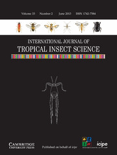
INTERNATIONAL JOURNAL OF TROPICAL INSECT SCIENCE
Pioneering Insights into Tropical EcosystemsINTERNATIONAL JOURNAL OF TROPICAL INSECT SCIENCE, published by Springer International Publishing AG, is a leading interdisciplinary journal dedicated to advancing knowledge in the fields of insect science and ecology. With its ISSN 1742-7584 and E-ISSN 1742-7592, this journal provides a platform for researchers to publish high-quality, peer-reviewed articles that explore various aspects of tropical insect biology, behavior, and their ecological impacts. As evidenced by its Q3 ranking in both Ecology, Evolution, Behavior and Systematics and Insect Science, it plays a vital role in fostering scientific dialogue and innovation within these disciplines. Researchers affiliated with the journal benefit from its visibility and growing impact, as demonstrated by its Scopus ranks, with a percentile standing of 61st in Insect Science. Although the journal is not open access, it still reaches a wide academic audience, making significant contributions to our understanding of tropical ecosystems. Situated in Switzerland, this journal is crucial for students, professionals, and researchers invested in the intersection of entomology and ecological science.

Insects is a prominent open-access journal published by MDPI, dedicated to advancing research in the vibrant field of insect science. Since its inception in 2011, this journal has become a vital resource for academics and professionals alike, also ranked in the prestigious Q1 category within the Insect Science field by Scopus, achieving a remarkable rank of 26 out of 181 journals. With an ongoing convergence period from 2010 to 2024, Insects provides comprehensive coverage of various aspects of entomology, including but not limited to ecology, behavior, physiology, and applied entomology. Based in Switzerland, the journal promotes an open-access model, ensuring that vital research is readily available to researchers, practitioners, and students globally. This journal not only facilitates the dissemination of groundbreaking entomological research but also fosters collaboration and interdisciplinary dialogue in the field.
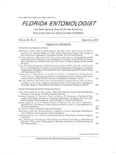
FLORIDA ENTOMOLOGIST
Illuminating the Path of Insect Science and EcologyFLORIDA ENTOMOLOGIST is a prestigious peer-reviewed journal dedicated to the advancement of entomological sciences, published by Walter de Gruyter GmbH. Since its transition to open access in 1994, the journal has become a vital resource for researchers, students, and professionals in the fields of Insect Science and Ecology, Evolution, Behavior, and Systematics. With an impact factor ranking high in its category—Q2 in Insect Science and Q3 in Ecology, Evolution, Behavior and Systematics—the journal showcases significant findings and contributions that shape our understanding of insect biology and its implications for ecological systems. The journal is indexed in Scopus, further establishing its relevance, with current rankings reflecting its competitive standing within Agricultural and Biological Sciences. Published continuously since 1982, FLORIDA ENTOMOLOGIST not only facilitates the dissemination of knowledge among entomologists but also encourages interdisciplinary collaboration, making it an essential publication for anyone invested in the scientific study of insects.
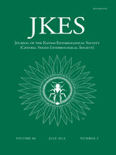
JOURNAL OF THE KANSAS ENTOMOLOGICAL SOCIETY
Fostering a Community of Entomological ExcellenceJOURNAL OF THE KANSAS ENTOMOLOGICAL SOCIETY, published by the Kansas Entomological Society, serves as a vital platform dedicated to the field of entomology and insect science. With an ISSN of 0022-8567 and an E-ISSN of 1937-2353, this journal has established itself since its inception in 1994, continuing to contribute valuable research up to 2024. Despite its current Q4 categorization in the 2023 Insect Science rankings, it ranks 106 out of 181 in Scopus, representing a significant opportunity for researchers to disseminate their findings in a supportive and engaged community. Although it is not an open-access journal, its commitment to rigorous peer review and relevance in agricultural and biological sciences makes it an essential resource for professionals, scholars, and students alike. The journal's focus on local and regional entomological issues often addresses broader ecological impacts, showcasing the importance of insects in environmental health and agriculture. We invite you to explore the rich tapestry of findings and discussions within this esteemed publication.
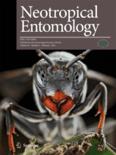
NEOTROPICAL ENTOMOLOGY
Connecting Researchers to the Richness of Neotropical EntomologyNEOTROPICAL ENTOMOLOGY, published by the Entomological Society of Brazil, is a leading journal in the field of Insect Science, recognized for its significant contributions to the understanding of entomological research within the Neotropical region. With an impact factor placing it in the Q2 category and ranked #52 out of 181 in the Scopus rankings for Agricultural and Biological Sciences, this journal provides a vital platform for both seasoned researchers and emerging scholars to publish their innovative findings. Covering a broad scope of topics related to entomology, NEOTROPICAL ENTOMOLOGY aims to highlight the unique biodiversity and ecological significance of insects, fostering further appreciation and study within this crucial area of life sciences. The journal is available in both print (ISSN: 1519-566X) and online (E-ISSN: 1678-8052), ensuring accessibility to a wide audience and enhancing the dissemination of knowledge. As it converges towards its 2024 volume, the journal remains committed to advancing the scientific understanding of insect life in the tropics, making it an essential resource for researchers, professionals, and students alike.
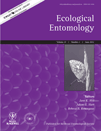
ECOLOGICAL ENTOMOLOGY
Advancing Knowledge at the Insect-Environment NexusECOLOGICAL ENTOMOLOGY is a leading peer-reviewed journal published by Wiley, focusing on the dynamic interplay between insects and their environments. With an ISSN of 0307-6946 and an E-ISSN of 1365-2311, this journal has been a pivotal resource in the fields of ecology and insect science since its inception in 1976, and is set to continue until 2024. Recognized for its high academic standards, the journal maintains a prestigious Q1 ranking in both the Ecology and Insect Science categories for 2023, and ranks in the 84th percentile among its peers in agricultural and biological sciences. Although not an Open Access journal, it provides vital insights into ecological processes and insect interactions, making it an essential read for researchers, professionals, and students committed to understanding and conserving biodiversity. The contributions published within its pages significantly advance the knowledge of ecological systems and inform practical approaches to environmental management.
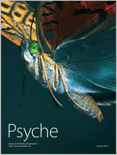
Psyche-A Journal of Entomology
Bridging Science and Conservation for InsectsPsyche-A Journal of Entomology is a distinguished open-access journal published by Hindawi Ltd, specializing in the field of entomology, including aspects of ecology, evolution, behavior, and systematics of insects. Established in 1874, this journal has a rich history of contributing to the scientific community by disseminating high-quality research related to insects and their diverse interactions within ecosystems. With an impact factor placing it in Q3 for both Ecology, Evolution, Behavior and Systematics and Insect Science, Psyche serves as a pivotal platform for researchers, professionals, and students aiming to deepen their understanding of insect-related science. The journal's commitment to open access ensures that research is accessible to a global audience, promoting collaboration and innovation in entomological studies. Covering a broad timeline of converged years from 1874 to 2024, Psyche fosters a comprehensive dialogue around insect biodiversity, conservation, and the ever-evolving dynamics of ecosystems in which insects play crucial roles.

JOURNAL OF INSECT SCIENCE
Illuminating the Role of Insects in Our EcosystemJOURNAL OF INSECT SCIENCE, published by OXFORD UNIV PRESS INC, stands as a pivotal platform in the field of insect science, offering open-access research since 2001. With an impactful presence in the academic community, this journal spans the convergence of entomology and various interdisciplinary studies, establishing itself in the Q2 quartile for both Insect Science and Medicine (miscellaneous) categories as of 2023. This esteemed journal is recognized for its contributions to the understanding and management of insect biology, ecology, and their implications for agriculture and human health, garnering a Scopus rank of 44 out of 181 in Agricultural and Biological Sciences. The Open Access model encourages wide dissemination of knowledge, making the rich repository of research accessible to a global audience. With ongoing publications until 2024, JOURNAL OF INSECT SCIENCE serves as an essential resource for researchers, professionals, and students seeking to deepen their understanding of the crucial role insects play in our ecosystem.
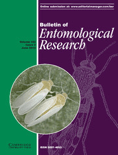
BULLETIN OF ENTOMOLOGICAL RESEARCH
Connecting Agriculture and Insect Science for Global ImpactBULLETIN OF ENTOMOLOGICAL RESEARCH, published by Cambridge University Press, is a prestigious journal that has been at the forefront of entomological research since its inception in 1910. With an impressive track record extending through to 2024, this journal serves as a vital platform for advancing knowledge in various related fields, notably Agronomy and Crop Science and Insect Science, where it ranks in the top quartile (Q2) and maintains a commendable position within the Scopus rankings in its categories. Notably, its contributions also intersect with Medicine in a broader scope, fostering interdisciplinary insights. While access to the journal content is not classified as 'Open Access,' its rigorous peer-reviewed articles are crucial for researchers, professionals, and students seeking to enhance their understanding of entomology and its applications in agronomy and beyond. The journal's impact is reflected in its notable percentile rankings, emphasizing its relevance and influence in the academic community. Located at the heart of the UK, the BULLETIN OF ENTOMOLOGICAL RESEARCH continues to be an essential resource for those dedicated to the study and understanding of insects and their impacts on agriculture and health.